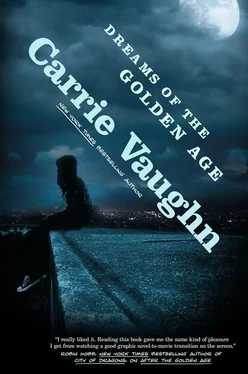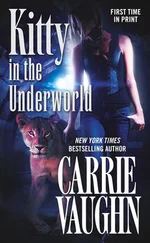When she was younger, people used to ask Celia why she didn’t just leave Commerce City if she wanted to get away from her parents’ shadow. She could never adequately explain why she had to stay. It was her city, she always said, vaguely, earnestly. She couldn’t leave.
Maybe Arthur was right. She was trying to do too much. Maybe it was time to delegate. Mark was already half on her side. He might be able to help her get Analise on their side, too.
“Mark, I want you to meet someone. Can you pick me up and go on an errand with me?”
She was grateful when he agreed.
* * *
Celia was even more grateful that Analise didn’t slam the door in her face when she and Mark showed up. It was early evening, when Analise was home from work at her job managing the downtown rec center.
“I’ll tell you everything, I swear,” Celia said, before hello even, and Analise paused. She and Mark must have looked very serious, standing there together, both of them still in their business suits from their workday.
Analise glanced over her shoulder to the staircase and, by extension, the kids’ bedrooms above them. “All right, but let’s go somewhere the kids can’t eavesdrop.”
A block from the town house, a small park occupied an empty lot between cross streets. After dark, the place was empty, and they gathered on a secluded bench.
Celia started, “Analise, I don’t know if you remember Mark Paulson—”
“We met briefly,” Mark said. “I don’t know if you remember, that stint Celia pulled in the hospital after the bus crash.”
Celia had forgotten that they’d both been in her room when everyone came to visit at once. Not that she’d been thinking too straight then, drugged up and suffering from a concussion.
“How can I forget the cute detective you ditched for the freaky telepath? I remember,” Analise said.
They both blushed at that one, how could they not? Didn’t help that Mark was still awfully cute. But with his serious calm and salt-and-pepper hair he also resembled his father, onetime mayor and Commerce City’s last serious supervillain. Kind of weird.
“Um. Yeah. Mark, Lady Snow and Stormbringer are her kids. I thought she should be in on the conversation about what to do about them.”
Analise’s gaze burned fierce. “You are not going to arrest them—”
“No, not at all,” Mark said. “This is entirely off the record. This … this all has to be off the record.” He looked to Celia to explain. She gathered herself and did so, carefully.
“There’s a genetic component to superhuman powers. It has to do with an accident that happened at a laboratory run by Simon Sito, the Destructor, that was funded by my grandfather and where your father worked. They were both there during the accident, along with a dozen workers. The powers originate there, and they’re passed down from parent to child. Not always.” She and Mark exchanged a glance there, because they’d never been entirely sure how much of their makeup came from that accident—they didn’t have powers, but they both had a love for and loyalty to the city that was almost superhuman. Was that part of the Leyden Labs inheritance, or a coincidence? “But sometimes, yes. I found this out by accident, but I’ve been tracking the lineages ever since. With our kids hitting puberty, along with about a dozen others, I wanted to get the potential inheritors into one place, so they’d be safer. So we could watch them.”
Analise glared at Celia. Wondering how much she’d told Mark, no doubt—or if Mark had guessed. It wasn’t hard, once you put all the pieces down on the same surface.
Mark made a peace offering. “Since we’re sharing secrets, I’ll tell you mine: Simon Sito, the Destructor, was my grandfather. I didn’t inherit anything, but I could have. That’s why I’m working with Celia, to try to prevent another Destructor from happening to the city.”
Celia expected shock, even horror from Analise, processing that information. But it was old history now. Abstract, irrelevant. Then, her friend’s brow furrowed as she decided if her own history was old enough to reveal.
But Analise shook her head. “As much as I’d like to go public some days, there’s still a warrant out, and no statute of limitations. I can’t say anything.” It was as much an offering as Analise could give, and it was enough.
“I understand,” Mark said.
Somehow, moving on after that became easier. They all knew where they stood now, even if the words hadn’t been spoken.
“I’ve been thinking,” Celia continued. “We know we’re not going to stop them from trying to be heroes. The powers come with the need to use them. Our choices are to lock them in their rooms until they’re eighty, and have them bust out anyway and do something crazy. Or we give them an outlet, and we supervise them.” Like keeping the secret elevator open. At least they would know where their kids were.
She looked at Mark. “I can give you my files—but only you. None of this gets recorded. And you have to keep the police off their backs. Watch them, supervise them, keep them out of serious trouble—hell, give them missions if you want. But keep it secret. Give them the freedom to figure this out on their own. It’s not like they’d actually listen to us. Analise, you know what they’re going through. Let them go back to Elmwood and be with their friends. They can help each other.”
Analise sat on the park bench, a little apart. She closed her eyes, put her face in her hands—thinking. And if she said no, absolutely not, and kept the kids out of Elmwood and told Celia and Mark to stay the hell away, would Celia stay away? No, she realized, she probably wouldn’t.
“Single parenthood’s been hard enough,” she said finally. “And now you slam this on me?”
“This is supposed to help them, Analise. To help you. It’ll be better, with more of us looking out for them.”
“You’re not doing this to try to manipulate them into creating a second Olympiad.”
“That’s an unintended side effect. Honest.” She wasn’t sure Analise or Mark believed that one, the way they were looking at her.
Analise said, “I just want to keep my kids safe. Whatever it takes.”
“Me, too,” Celia said. “And I have some ideas about how to do that.”
* * *
For a stretch of time in her teens and early twenties, Celia had been the object of about a dozen kidnappings. Her parents’ secret identities had been revealed, the Olympiad’s cover blown, and she became the ultimate target for villains and supervillains who thought they could attack the heroes by holding her hostage. The scheme never worked, and the Olympiad rescued her every time. She’d never been seriously hurt, and only a little traumatized. Okay, maybe a lot traumatized.
Now, sitting in a nondescript, inoffensive doctor’s office waiting to hear the results of a barrage of tests felt a little like being kidnapped. Time had slowed, her future had become fuzzy. But she couldn’t see her captors, and she had no bindings to struggle against. To ground her. She felt like she was floating, and her heart raced. She had been kidnapped in a sense, hadn’t she? It was enough to make her nostalgic.
But this time, she couldn’t look her captor in the eye, there’d be no pompous monologue about his nefarious plans. And the Olympiad wasn’t on the way to save her.
She took Arthur’s hand, held it a little more tightly than she meant to.
The checkup three days ago hadn’t gone the way Celia expected. She expected the doctor to tell her she had a cold or some other virus. Mono, maybe. That she needed to rest, take a vacation like Arthur said. She’d have her temperature and blood pressure taken, her heart would race a little, the doctor would tsk at her and send her home with anti-anxiety medication.
Читать дальше












